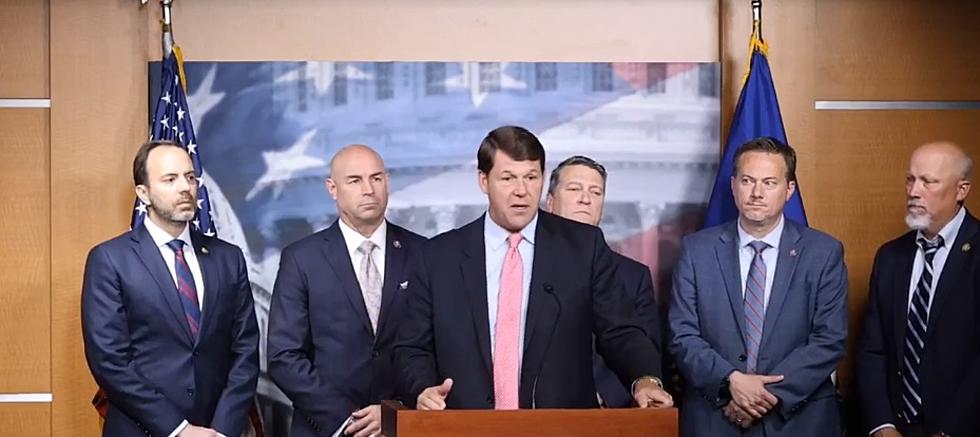
Chad’s Morning Brief: Rick Perry Defends In-State Tuition For Illegal Immigrant Students, Texas is the Epicenter of the Conservative Movement, and Other Top Stories
Here is your Morning Brief for the morning of September 22, 2014. Give me your feedback below and tune in to The Chad Hasty Show for these and many more topics from 8:30 to 11am. Remember, you can listen online at KFYO.com or on your iPhone/Android with the radioPup App.
Perry Defends Law
Speaking at the Texas Tribune Festival over the weekend, Governor Rick Perry defended the 2001 law that allowed students in the country illegally to receive in-state tuition. As the Austin American Statesman points out, he isn't the only Republican speaking out in favor of the law.
Gov. Rick Perry Sunday defended the Texas law he signed in 2001 that allows students residing here without legal authorization to pay in-state tuition for public colleges and universities, a provision opposed by both U.S. Sen. Ted Cruz and state Sen. Dan Patrick, the Republican nominee for lieutenant governor.
In answer to a question from a University of Texas student at the Texas Tribune Festival, Perry associated himself with comments made Friday night at the festival by George P. Bush, the GOP nominee for land commissioner. Bush said that, “until there’s a sensible alternative that has been presented by anybody else,” he supports keeping the Texas law offering in-state tuition to those who have graduated from a high school or received a GED diploma in Texas, have lived in the state for at least three years and have signed an affidavit affirming they are seeking legal residency.
Said Perry, “We have to remember that the reason we had to address this as a state was because of the federal government’s total and abject failure of securing our border with Mexico, so we don’t have the luxury of doing anything other than addressing this, and in 2001, members of the Legislature debated it, they talked about it, and they came to the conclusion that we had some options and the option they chose was in the best economic interests of the state of Texas,”
“Young people who were here by no fault of their own, and I would suggest in every case that decision wasn’t made by a six-year-old — ‘we’re going to the state of Texas so I can go to the University of Texas’ — but economically what was in the best interests of the state of Texas was to give these young people the opportunity to be givers rather than takers, to be a constructive part of this society, and that’s what we did,” Perry said.
Texas was the first state to enact in-state tuition, passing the bill with only four dissenting votes.
Patrick, who would preside over the Senate if elected lieutenant governor, has vowed to seek its repeal. His Democratic opponent, Sen. Leticia Van de Putte, was an original sponsor of the legislation and wants to keep it.
Sen. Wendy Davis, in her one-on-one conversation with Tribune editor-in-chief and CEO Evan Smith on Saturday, said she considered the law a great success, and if she were governor and the Legislature sent her a bill repealing the law, “I would veto it in a heartbeat.” Her Republican rival, Attorney General Greg Abbott, has called the law “noble” but “flawed,” and said it needs to be reformed, but hasn’t spelled out how.
In his appearance at TribFest Saturday, Cruz said that he would not to presume to tell Texas legislators what to do, but that he opposes the law on principle.
“I don’t think taxpayers should be subsidizing the education of people who are here illegally at the expense of American citizens and at the expense of legal immigrants,” said Cruz, a potential presidential rival of Perry’s if both men end up seeking the Republican Party nomination in 2016.
Perry paid a heavy political price for his position on in-state tuition when he sought the Republican presidential nomination in 2012, alienating many conservative voters when, at a debate in September 2011, he defended the law, saying, “If you say that we should not educate children who come into our state for no other reason than that they’ve been brought there through no fault of their own, I don’t think you have a heart.”
When Smith, who was Perry’s interlocutor for the hour-long conversation that brought the festival to a close, noted that Perry was booed at the 2011 GOP debate for depicting critics of in-state tuition as “heartless,” Perry said, “that was probably a poor use of the term.”
It will be interesting to see how Perry's backing of the law plays to the national audience when he runs for President.
You can read the entire article by clicking on the link above.
Texas Conservatism
Dan Balz of The Washington Post over the weekend wrote about how Texas had become the "epicenter of the conservative movement". In his piece, Balz takes a look at Texas state-wide elections and also how the Texas conservative movement may play on the national stage.
The platform also calls for repealing the U.S. Constitution’s 17th Amendment, which allows the direct election of senators by popular vote, and returning that power to the state legislatures. The document decried the “appointment of unelected bureaucrats” and called on Congress to “defund and abolish” such positions. It also urged the legislature to “ignore, oppose, refuse, and nullify any federal mandated legislation which infringes upon the states’ 10th Amendment Right.”
Platforms often are ignored by elected officials and should not be taken too seriously as a blueprint for how a party would govern. But the 2014 document is a measure of what the most ardent activists in the state see as an ideal.
Democrats believe the GOP is now outside the mainstream of the Texas electorate. They will be tested to show that in November. Over time, they count on the state’s changing demographics either to bring them to power or to force the Republicans to shift back to the center.
Davis sought to make Abbott’s views an issue in their first debate Friday night. She went on offense, but Abbott parried effectively. Her hope now is to tap the energy around her candidacy to produce a bigger-than-expected turnout in November.
Meanwhile, the question is to what extent the Texas brand of conservatism is exportable in a national election. Perry and Cruz both are both considered possible 2016 candidates.
Perry’s platform would be built around the state’s economic gains and job growth during his tenure — a philosophy of low taxes, less regulation, fewer services and business incentives. Memories of his disastrous 2012 campaign stand as an obstacle in his path.
Cruz is the far more popular potential presidential candidate among Texas Republican activists, already eclipsing Perry even though he has been in office for not quite two years. He has lit a fire at party and conservative gatherings and appears poised to test his ideas in a national campaign.
Texas proudly thinks of itself as a nation-state. It has produced three presidents since the last half century — two Republicans named Bush and Lyndon B. Johnson. But will the country embrace the new Republican Party of Texas, if given the opportunity?
You can read the entire piece by clicking on the link above.
Other Must Read Links:
These and many more topics coming up on today’s edition of The Chad Hasty Show. Tune in mornings 8:30-11am on News/Talk 790 KFYO, streaming online at kfyo.com, and now on your iPhone and Android device with the radioPup App. All guest interviews can be heard online in our podcast section after the show at kfyo.com.
More From News/Talk 95.1 & 790 KFYO









